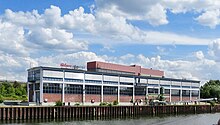Rickmers rice mill
The Rickmers Rice Mill Ltd. is a rice milling company based in Bremen .
history
In 1837 JH Buschmann founded a steam mill in St. Magnus , which he wanted to expand into a rice mill. After the wood and coal merchant Friedrich Konitzki acquired the property in 1858, the planned rice mill was set up. In 1860 Louis Eduard Ichon (1811–1890) bought the mill on Grünenstrasse; this is how the rice company Ichon & Co.
In 1872 the Helgoland shipyard and shipping company founder Rickmer Clasen Rickmers (1807–1886) took part in the operation under the new name Ichon & Rickmers . Rickmers discovered his passion for shipping early on, moved to Bremerhaven in 1832 and laid the foundation for his future ship empire in 1834, in which he first founded the Rickmers shipyard and later expanded the company to include a shipping company. In 1870, the majority of his fleet was used in East Asia . The fast sailors of Rickmers-Rhederei carried millions of sacks of rice. Due to the war of secession (1861–1865), the exports of travel to Europe ceased, so that European companies resorted to other sources, especially Asia. Rickmers' participation in rice production and later in trading was therefore an obvious choice. The son Andreas Rickmers (1835-1924) and Ichon's son Willy Ichon ran the business.
In 1878, RC Rickmers took over the entire rice mill in Bremen. The company has now been renamed Rickmers Reismühlen and the Ichon family left the management. In 1883 a starch factory was also founded in Hannoversch Münden . In the mid-1880s, Rickmers Reismühle was one of the largest rice processing companies in the world.
In 1886, after the death of RC Rickmers, the sons Andreas Rickmers and Peter Rickmers (1838–1902) took over the management of Rickmers Reismühlen Rhederei und Schiffbau AG , which was named from 1889 ; Andreas ran the rice business there. In 1893 the North German Reismühle was founded in Hamburg . The company A. Markwald & Co. in Bangkok was added in 1894, as well as holdings in the First Triester Reisschäl-Fabrik and the Aussiger Reismühle AG in Austria . In 1901 a total of nine German rice mills merged to form the Reis- und Handels-Aktien-Gesellschaft with headquarters in Bremen. Andreas Rickmers became chairman of the supervisory board of the AG and remained this until 1910. The competition between the Hamburg companies in the free port supported by English capital was very strong.
In 1910 Andreas Rickmers sold his shares in the family company to his nephew Paul Rickmers (1873–1946). In this context, he left the Reis- und Handels AG as well as the Rickmers Reismühlen, Rhederei und Schiffbau AG. In 1912 the name "Reismühlen" disappeared from the family company's name. From then on it was called "Rickmers Rhederei und Schiffbau AG". The company Reiswerke Rickmers GmbH , headed by Robert Rickmers, continued to exist unchanged under the umbrella of Reis- und Handels AG.
The company buildings were destroyed by bombs during World War II. The company's office was now on the Stintbrücke in Bremen and the reconstruction was in progress. The plants were in 1963 in the possession of the company KELLOGG GmbH over in Germany.
Today's company
Rickmers Reismühle GmbH has been independent again since 1988 and operates under the old name with headquarters in Bremen-Überseestadt , Stephanikirchenweide, directly on the Weser. The assortment (whole grain rice, rice semolina, rice bran, rice flakes and rice powder) ranges from rice products for wholesalers and end consumers with a variety to special products for the food industry. 30,000 tons (as of 2009) rice products are produced annually.
literature
- Sören Dannhauer: German rice trade 1850 to 1914. The central role of Bremen and the Rickmers family in a global food market. German Maritime Studies, Vol. 22nd 2014.
- Herbert Black Forest : The Great Bremen Lexicon . 2nd, updated, revised and expanded edition. Edition Temmen, Bremen 2003, ISBN 3-86108-693-X .
